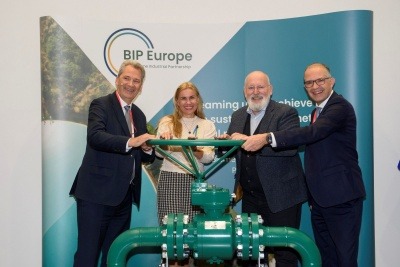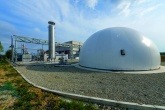Biomethane Industrial Partnership to support 35 bcm target by 2030
The European Commission and industry leaders from across EU Member States have teamed up to create the Biomethane Industrial Partnership (BIP) and deliver an ambitious target: to sustainably produce and use 35 billion cubic metres of biomethane by 2030.
 Launched last September, a new public-private Biomethane Industrial Partnership (BIP) is set to support the rapid scale-up of sustainable biomethane production and use. Made up of representatives from the European Commission; EU Member States (MS); companies active in the biomethane value chain; civil society, and academia, BIP’s Task Forces will aim to lift barriers on permitting and grid injection, identify novel sustainable biomass sources, and instigate further advancements in research, development, and innovation among others. The work in the BIP has already kicked off with the official launch of Task Force 1 focusing on the creation of national biomethane targets, strategies, and policies, and Task Force 2 focusing on the acceleration of the biomethane project development.
Launched last September, a new public-private Biomethane Industrial Partnership (BIP) is set to support the rapid scale-up of sustainable biomethane production and use. Made up of representatives from the European Commission; EU Member States (MS); companies active in the biomethane value chain; civil society, and academia, BIP’s Task Forces will aim to lift barriers on permitting and grid injection, identify novel sustainable biomass sources, and instigate further advancements in research, development, and innovation among others. The work in the BIP has already kicked off with the official launch of Task Force 1 focusing on the creation of national biomethane targets, strategies, and policies, and Task Force 2 focusing on the acceleration of the biomethane project development.
The REPowerEU Plan and the BIP
The need to extend biomethane production and usage in Europe is more urgent than ever; to reduce dependency on natural gas imports from Russia and high energy prices and to address the climate crisis. The cheapest and most rapidly scalable renewable gas available today, biomethane can contribute to an integrated net-zero energy system, diversify farmers’ incomes and ensure a circular approach in the agricultural sector. Therefore, the European Commission set, in its REPowerEU Plan, an objective for the EU MS to increase their production and use of sustainable biomethane from three billion cubic meters (bcm) annually in 2022 to 35 bcm by 2030, and specifically called for the launch of the BIP to stimulate this ambitious new target. Achieving this goal requires biomethane investments in all EU MS. All this can be possible only if the EU MS and the value chain collaborate, and this is exactly what the BIP aims to support. The BIP is one of the cornerstones for Europe on its path to achieving a carbon-neutral and sustainable energy system.
The Role of the Biomethane Industrial Partnership
During the 2022 EU Sustainable Energy Week (EUSEW), the significance of the BIP’s mandate was voiced by Frans Timmermans, Executive Vice-President of the European Commission for the European Green Deal, stating that “the BIP will be instrumental in ensuring an increase in the annual production and use of biomethane to 35 bcm by 2030”. Also, Kadri Simson, European Commissioner for Energy, pointed out how the BIP will be fundamental to realise Europe's potential for biomethane production, by helping stakeholders to surpass barriers to growth, learning from best practices and promoting collaboration to increase the use and production of biomethane. Following its official launch in the EUSEW, this message was even further highlighted by the speech of Janusz Wojciechowski, Agricultural Commissioner, during the technical kick-off of the BIP, stating that “biomethane could be a 'win-win', both for improving energy security and reducing greenhouse gas emissions and for providing economic opportunities to rural areas”.
How does the BIP work?
While the Secretariat is responsible for the day-to-day operations of the BIP, the Governing Board (GB) is the highest body steering the Partnership that consists of representatives of the European Commission, EU Member States and the biomethane value and supply chain. To allow the effectiveness of the Partnership, the Support Group (SG) gathers representatives from the biomethane value chain. Made up of 12 members currently, the SG is expanding to reach twenty individual companies chosen by the value chain. All companies active in the biomethane value chain can currently apply for SG membership.
The Task Forces are formed of expert-level members from the European Commission, EU Member States, companies active in the biomethane value chain, civil society, and academia, who teamed up to tackle challenges within their Task Force. Each Task Force focuses on a different topic, ranging from rapidly scaling up a cost-efficient production of biomethane, lifting barriers such as speeding up permitting and grid injection, identifying novel sustainable biomass sources to promoting more circular agriculture, and advances in research, development, and innovation. The BIP will help its members to share best practices in technological and business solutions, as well as in national support mechanisms for biomethane production and grid injection, fostering collaboration between the EU MS in policy making and, in the longer term, facilitating the creation of a liquid EU biomethane market.
The BIP Task Forces
In the past months, the BIP received more than one hundred applications for Task Force membership, coming from companies active in the biomethane value chain, civil society, academia and other relevant stakeholders.
Task Force 1 is currently composed of Member States who are currently working together on ensuring that biomethane production and use are enshrined in the National Energy and Climate Plans (NECPs) which are to be submitted in June 2023. Value chain members have also been added as associated members to share the market’s perspective and needs ranging from production to end-use.
In Task Force 2, 3 & 4 the partnership is addressing the important topics around biomethane project development, innovative biomethane sources and cost efficiency.
Task Force 2 is committed to rapidly increasing sustainable biomethane production capacity by identifying solutions to scale-up investments. Task Force 3 identifies the potential of biomethane across the EU for innovative biomass sources and explores the potential of digestate for more circular agriculture. While Task Force 4 works to identify and facilitate ways to decrease the cost of biomethane production and grid connection, Task Force 5 is committed to identifying and supporting research, development and innovation in biomethane production, grid connection and end-use applications.
The work of the BIP is kicking off already
Biomethane is one of the major renewable gases of the future in Europe, fitting into a circular economy. It is the cheapest and most scalable renewable gas today, with large sustainable growth potential in every Member State in Europe. The commitment to enable this scale-up of sustainable biomethane across Europe is large, and the work is commencing to accelerate by minimising barriers, speeding up project realisation, and unlocking sustainable feedstock against affordable pricing. Research and innovation will further help the acceleration in the years to come.
This feature was originally written by Resource Media for the REA's Organics Recycling and Biogas magazine. The Association for Renewable Energy and Clean Technology (REA) is the UK's largest renewable energy and clean technology body, representing around 550 member companies.







